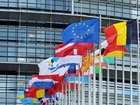The head of Hezbollah’s Loyalty to Resistance parliamentary bloc, MP Mohammed Raad, has said that his son Abbas has been slain while seeking to “lift injustice and resist tyranny and Zionist savagery and the savagery of all the enemies of humanity.”
“We are firm on this path, we will carry on … and we want the pride and dignity of our people and nation,” Raad said as he received the coffin of his slain son.
 Full Story
Full Story
For the second consecutive day, Israeli Foreign Minister Eli Cohen has warned that ongoing attacks by Hezbollah against Israeli targets could lead to all-out war in Lebanon.
“The attacks by Hezbollah, Iran’s proxy, could lead to war in Lebanon,” Cohen says in a briefing to the media.
 Full Story
Full Story
Hezbollah fired 48 rockets at an Israeli military base on Thursday and carried out at least 10 other attacks on Israeli positions near the frontier, a day after an Israeli strike killed five Hezbollah fighters, including the son of the head of the group’s parliamentary bloc.
Air raid sirens sounded across northern Israel as Hezbollah fired 48 Katyusha rockets at the Ein Zeitim Israeli military base near the town of Safed in northern Israel, about 10 kilometers from the border. The Israeli military said it was striking the sources of the launches.
 Full Story
Full Story
Iran's Foreign Minister Hossein Amir-Abdollahian met Thursday with Hezbollah leader Sayyed Hassan Nasrallah at an undisclosed location in Lebanon.
In a statement, Hezbollah said Amir-Abdollahian and Nasrallah "reviewed the latest developments in Palestine, Lebanon and the region, and... the efforts made to end the Israeli aggression against the Gaza Strip".
 Full Story
Full Story
Hezbollah said Thursday that five of its fighters, including the son of a senior lawmaker, had been killed, amid skirmishes at the Israel-Lebanon border since the Israel-Hamas war began.
Abbas Raad, son of the head of Hezbollah's parliamentary bloc Mohammed Raad, was "martyred on the road to Jerusalem", the group said in a statement -- the phrase it has been using to announce the death of its members due to Israeli fire since the war started on October 7.
 Full Story
Full Story
Hezbollah chief Sayyed Hassan Nasrallah has met in Lebanon with Khalil al-Hayyeh, who is Hamas’ deputy head in Gaza and its Arab and Islamic relations officer.
A statement issued by Hezbollah said the two men discussed the latest events since October 7 and evaluated the stances, developments and possible scenarios on all fronts, especially in the Gaza Strip.
 Full Story
Full Story
Border skirmishes continued Wednesday between Israel and Hezbollah, as a source from the Lebanese group said that Hezbollah will abide by a truce between Israel and Hamas that will begin on Thursday.
In the morning, Israeli warplanes bombed the outskirts of the southern Lebanese border towns of Naqoura, Majdal Zoun, Shihin, Yater, Siddiqin and Recheknanay.
 Full Story
Full Story
The German government is bringing home most of the soldiers that were deployed to the eastern Mediterranean for a possible evacuation of German citizens from Lebanon.
About 1,000 German soldiers are to leave the island of Cyprus starting Wednesday, according to German news agency dpa. A small team of about 200 as well as material and equipment will remain behind. The decision was made following an assessment of the current conflict in the Middle East.
 Full Story
Full Story
The Delegation of the European Union and the Embassies of the EU Member States to Lebanon have called for “restraint” in the current hostilities between Israel and Hezbollah while calling on Lebanon to elect a president and end its lengthy presidential vacuum.
 Full Story
Full Story
U.N. Special Coordinator for Lebanon Joanna Wronecka and the U.N. Under-Secretary-General for Peace Operations Jean-Pierre Lacroix have briefed the U.N. Security Council on the implementation of Security Council Resolution 1701, which ended the 2006 war between Israel and Hezbollah, based on the latest report of U.N. Secretary-General Antonio Guterres.
 Full Story
Full Story



